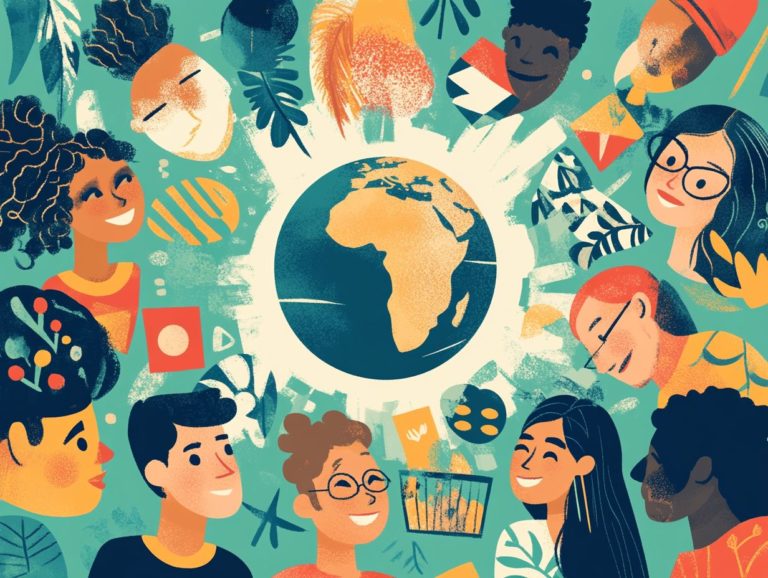the impact of culture shock on language acquisition
Culture shock can be a profoundly transformative experience for anyone stepping into a new environment. It often reaches beyond mere daily routines and significantly influences your journey in language acquisition, shaping how you learn and interact with a new language.
This article delves into the intricacies of culture shock, examining its causes and its impact on language learning. Discover practical strategies that will empower you to overcome these challenges, the advantages of language immersion, and the essential role of cultural competence understanding and respecting different cultures in fostering effective communication.
Together, you ll navigate the complex relationship between culture and language.
Contents
- Key Takeaways:
- Understanding Culture Shock
- The Relationship Between Culture Shock and Language Acquisition
- Strategies for Overcoming Culture Shock in Language Acquisition
- The Role of Language Immersion in Adapting to a New Culture
- Cultural Differences in Language Learning
- The Importance of Cultural Competence in Language Learning
- Frequently Asked Questions
- What is culture shock and how does it impact language acquisition?
- What are some common signs of culture shock in relation to language acquisition?
- How can culture shock affect an individual’s confidence in learning a new language?
- Are there any strategies that can help individuals cope with culture shock and improve their language acquisition?
- Can culture shock have a positive impact on language acquisition?
- Is there a specific time frame for when culture shock may impact language acquisition?
Key Takeaways:

- Culture shock can greatly impact language acquisition because it can create mental barriers and hinder the learning process.
- Strategies for overcoming culture shock include immersing yourself in the new language and culture, seeking support from local communities, and being open-minded and adaptable.
- Understanding cultural differences and developing cultural competence is essential for effective language learning and communication.
Understanding Culture Shock
Understanding culture shock is essential as you navigate the adjustment process in a new environment. This phenomenon often presents itself as a blend of excitement and anxiety, giving rise to challenging emotions like loneliness and frustration.
For many international students, this psychological experience can obstruct their ability to fully immerse themselves in their new surroundings. It affects everything from academic performance to language acquisition. Acknowledging these feelings is the crucial first step toward breaking down communication barriers and facilitating a smoother transition into a different culture.
Defining Culture Shock and Its Causes
Culture shock is the disorientation you feel when encountering a different culture. This phenomenon significantly impacts international students and can be profoundly unsettling.
It stems from various factors such as communication barriers, unfamiliar customs, and differing social norms. You might find it challenging to express yourself in a foreign language, leading to feelings of isolation and frustration.
Cultural differences in values and behaviors can further complicate matters, making it difficult for you to connect with peers and navigate everyday interactions. As a result, these elements can give rise to negative emotions during your adjustment process, including anxiety, homesickness, and confusion, transforming the transition to a new environment into a challenging and overwhelming journey.
The Relationship Between Culture Shock and Language Acquisition
The connection between culture shock and language acquisition is crucial for international students. It significantly impacts their capacity to learn a second language while navigating a new environment, shaping their experiences and determining how seamlessly they adapt to their surroundings.
How Culture Shock Affects Language Learning
Culture shock plays a significant role in your language learning journey as an international student. It creates psychological barriers that can obstruct effective communication.
This experience often amplifies feelings of anxiety, frustration, and even isolation, further complicating your ability to engage in conversation and practice your second language.
When you confront unfamiliar cultural norms and values, your emotional responses can divert your attention from language acquisition. This makes it difficult to grasp new vocabulary and grammar.
Communication barriers, arising from both language limitations and cultural misunderstandings, may deter you from participating in discussions or seeking assistance. Ultimately, this stifles your confidence and motivation to learn and practice effectively.
Strategies for Overcoming Culture Shock in Language Acquisition

Overcoming culture shock is crucial for you as an international student. It significantly influences your adjustment process and your ability to communicate effectively.
Embracing this challenge will enhance your language learning journey and set you up for success in your new environment.
Tips for Dealing with Culture Shock
Dealing with culture shock requires practical strategies. These strategies ease your adjustment and minimize communication barriers.
Engaging in open conversations with local peers enhances your understanding of cultural norms and practices.
Exploring community events or cultural festivals immerses you in your new environment.
Managing stress is essential. Techniques like mindfulness meditation or regular exercise can alleviate anxiety.
Consider creating a language exchange partnership. This will not only boost your language skills but also foster connections with native speakers.
Keeping a journal of your experiences provides clarity as you navigate this transformative phase.
The Role of Language Immersion in Adapting to a New Culture
Language immersion is crucial for international students adapting to a new culture. It enhances language skills and makes it easier to connect with peers.
Benefits and Challenges of Language Immersion
Language immersion offers many benefits, including improved language skills and a deeper understanding of cultural differences. However, it also brings challenges that might affect your adjustment.
Being around native speakers lets you practice your conversational skills, boosting fluency and confidence. But this can feel intimidating if you’re struggling with the language.
While immersion can lead to lasting friendships, it may also create feelings of isolation if language barriers hinder communication. Finding balance is essential for your success.
Cultural Differences in Language Learning
Cultural differences shape how students learn languages and navigate communication barriers.
How Cultural Differences Impact Language Acquisition

Cultural differences significantly influence how you learn a new language. They affect your emotional responses, which can lead to feelings of anxiety or isolation.
These emotional challenges can hinder effective learning, making social interactions or classroom participation difficult.
However, finding connections between your culture and the new one can spark your passion for learning. In a supportive environment that celebrates diversity, you re not just mastering a language, but also building a sense of belonging.
This nurturing atmosphere enhances your educational journey and allows your enthusiasm to flourish.
The Importance of Cultural Competence in Language Learning
Cultural competence is crucial for international students on their language learning journey. It fosters a richer understanding of diverse cultures and supports the adjustment process.
By embracing cultural differences, students can navigate their new environments with more confidence.
Developing Understanding of Different Cultures for Effective Language Learning
Developing an understanding of different cultures is essential for international students. It helps navigate communication barriers and fosters a deeper appreciation of the new culture you re experiencing.
By immersing yourself in local traditions and practices, you ll gain a greater appreciation for the nuances of the language you re learning. Engaging in community events, attending cultural workshops, or taking part in local volunteer opportunities will enhance your exposure to diverse cultural norms and communication styles.
Forming friendships with native speakers offers valuable language practice and opens up avenues for richer cultural exchange. You can also explore local history and customs, enriching your context and transforming language learning into a more holistic experience.
Frequently Asked Questions
What is culture shock and how does it impact language acquisition?
Culture shock is the feeling of disorientation and discomfort individuals experience when they suddenly immerse themselves in a new culture. It can impact language acquisition by causing difficulties in communication and learning new language skills.
What are some common signs of culture shock in relation to language acquisition?

Common signs of culture shock affecting language acquisition include:
- Difficulty in understanding and expressing oneself.
- Feeling frustrated or anxious when speaking in the new language.
- Relying on one’s native language even in a new cultural environment.
How can culture shock affect an individual’s confidence in learning a new language?
Culture shock can significantly impact an individual’s confidence in learning a new language. It can make them feel self-conscious and embarrassed when making mistakes, leading to a decrease in their motivation to continue learning and practicing the new language.
Are there any strategies that can help individuals cope with culture shock and improve their language acquisition?
Yes, several strategies can help individuals cope with culture shock and improve their language acquisition:
- Immerse yourself in the new culture.
- Seek support from language exchange programs or local language classes.
- Practice your language skills regularly.
Can culture shock have a positive impact on language acquisition?
Surprisingly, culture shock can actually boost your language learning! It can motivate individuals to learn and adapt to the new language quickly, as well as provide a deeper understanding and appreciation for the new culture and its language.
Is there a specific time frame for when culture shock may impact language acquisition?
The impact of culture shock on language acquisition can vary from person to person and may depend on the duration of exposure to the new culture. Some individuals may experience culture shock immediately, while others may take longer to adjust. It is essential to be patient and allow yourself time to adapt to the new culture and language.
Embrace the adventure of language learning and cultural exploration. Your journey starts now!






